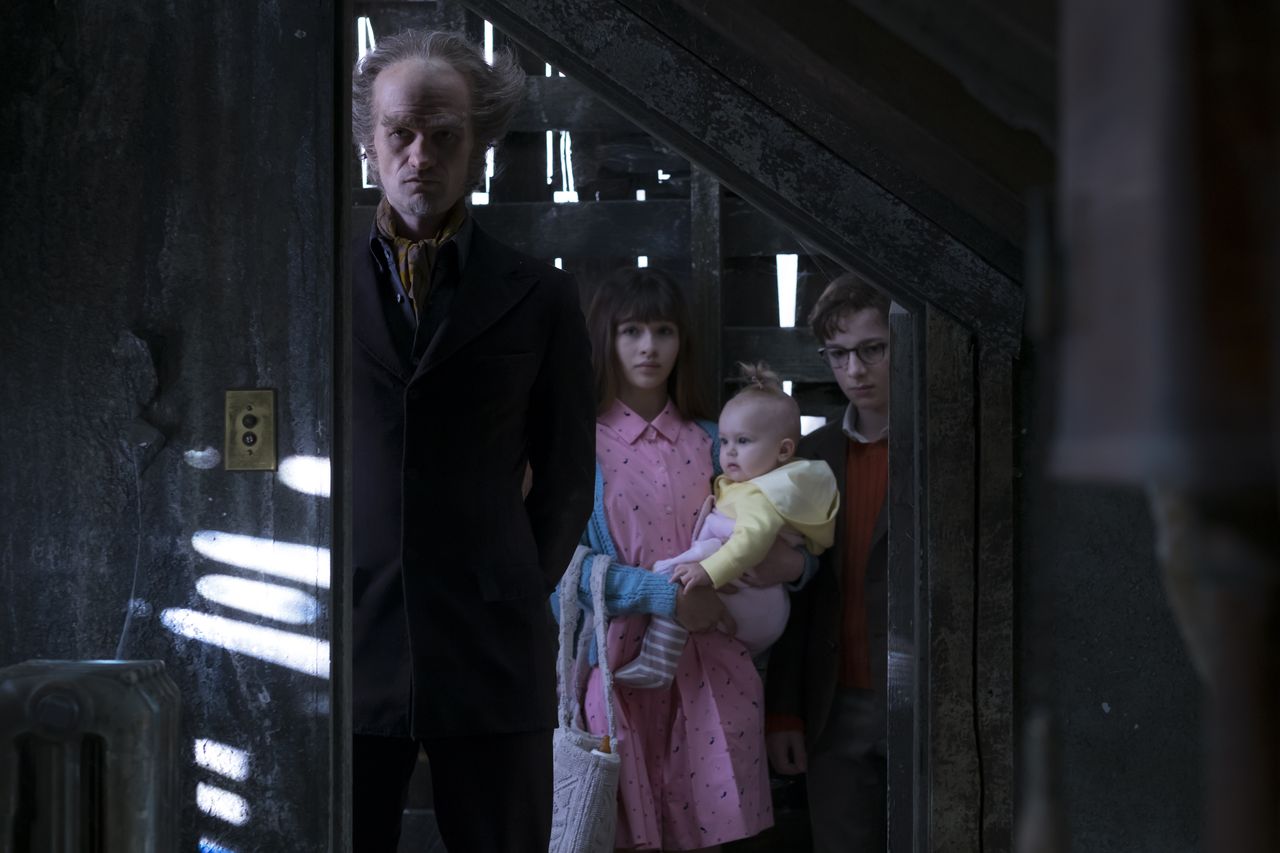Why A Series of Unfortunate Events is extreme Netflix
This isn't really a TV series. It's a Netflix series. There's a difference.


Netflix's A Series of Unfortunate Events is not — despite what Wikipedia will tell you — a television series.
By turns depressive, plucky, and arch, the show is stuffed with plot holes from which you'll politely look away, too charmed by its pleasantly gothic sensibility to care. It's Harry Potter meets Clue. It's a cozy story on a rainy night. But it is emphatically not television, a word which here means a bit of scripted onscreen entertainment, usually constrained by ads that force act breaks and impose a fairly strict episodic structure.
No such structure is present here. Only in the very loosest sense can some of these eight installments even be called "episodes" — several stop at arbitrary points — nor, taken together, do they form the sort of narrative arc we mean when we refer to a "television season." Narrator Lemony Snicket (played by Patrick Warburton) conveys the deliberate shapelessness of the series best: "If you are interested in stories with happy endings, then you would be better off somewhere else. In this story not only is there no happy ending, there is no happy beginning, and very few happy things in the middle."
Subscribe to The Week
Escape your echo chamber. Get the facts behind the news, plus analysis from multiple perspectives.

Sign up for The Week's Free Newsletters
From our morning news briefing to a weekly Good News Newsletter, get the best of The Week delivered directly to your inbox.
From our morning news briefing to a weekly Good News Newsletter, get the best of The Week delivered directly to your inbox.
The eight-episode adaptation covers four of Daniel Handler's popular Lemony Snicket books about the three Baudelaire children — Violet, Klaus, and baby Sunny — whose parents died in a fire. Now homeless, the children are at the mercy of Mr. Poe, a banker whose kindly combination of bureaucratic blindness and dismissive unconcern K. Todd Freeman nails perfectly. In his zeal to find them a guardian, he never heeds the children's warnings; specifically, he fails to appreciate that their "enormous fortune" (which they will inherit when Violet turns 18) has made them the target of their distant relation Count Olaf (Neil Patrick Harris), an appallingly poor actor and the series villain. Poe keeps finding the children new guardians and Count Olaf keeps picking them off — usually in disguise as a character he can barely commit to for longer than 30 seconds at a time. This is the show's structure. This is the cycle that, every two episodes, repeats.
The Lemony Snicket books dramatize the childhood experience of being jerked around by life. That seasickness in the storytelling might explain the Netflix adaptation's funny math: two episodes = one book; four books = one season. It's a jarring way to carve up the plot. By splitting one story into two episodes, you create the expectation that the season will be serialized — that we're following one particular story, that things will build, that characters in earlier episodes will periodically recur. (Joan Cusack! I thought. Hooray!) That expectation lurches to a halt. The Baudelaires burn through their guardians on a strict two-episode cycle: just long enough for us to get used to them, just short enough for us to feel unstable when they die and the series moves on and resets.
But that's a weird and completely un-television-like rhythm. So is the series' amusing habit of weaving in commentary from the narrator (Warburton), usually through pessimistic vocabulary lessons that darkly remind you that this will end badly.
That latter habit, in particular, toys with us. We're so used to seeing conspiracies everywhere in television that we think, Surely the narrator is lying to us, and watch with heightened interest and perverse hope. Then A Series of Unfortunate Events teases us with clues and symbols and talk of secret societies and — most audaciously — cuts to an adventurous "Mother" and "Father" who have escaped imprisonment and are trying to work their way back to their children. The Baudelaires seem to be in luck! Their parents are alive!
But Lemony Snicket's warnings turn out to be true. That, as much as anything else, is an index of just how experimental and weird non-television TV is getting.
TV shows used to be consumed on a weekly basis. If "binge-watching" aptly describes our new habits of consumption, it's because the term recognizes — without judgment — that there are significant differences between the pleasures of drinking a glass vs. drinking the bottle. A Series of Unfortunate Events just wouldn't have worked as a weekly series — the part one-part two structure would have annoyed viewers who couldn't continue eagerly on, treating the credits at the end of part one as the streaming equivalent of a commercial break.
People being people — draining the bottle whenever they can — Netflix began to adjust its programming to this new way of watching. Episodes of a program didn't have to abide quite so stringently to conventional TV structures. And yes: Sometimes the results are baggy or odd. Sometimes traditional shows morph into peculiar formal experiments, as the Gilmore Girls revival did with its four 90-minute episodes. (A Series of Unfortunate Events might have benefited from that exact structure — if each book were one ultra-long episode instead of two disjointed ones, it wouldn't feel quite so full of stutter-starts.)
The payoff is that a Netflix show — not being television — can really think about how messing with form and delivery affects its storytelling. I enjoyed A Series of Unfortunate Events, but I can't say I particularly liked that lurching two-step pattern. That's partly, I suspect, because the form mirrored — in a discomfiting way — the instability the Baudelaires were experiencing onscreen. I can easily believe that's a deliberate effect; this is a narrative that constantly thinks aloud about the viewer, after all.
"I prefer long-form television to movies, it's so much nicer to watch in the comfort of your own home," Count Olaf says, staring into the camera. The opening credits do much the same: "This show will wreck your evening, your whole life and your day," they warn. "Every single episode is nothing but dismay, so look away. Look away. Look away!"
But you don't, and you have no one but yourself to blame for your bad mood.
Editor's note: A previous version of this article misattributed a quote. It's been corrected. We regret the error.
Sign up for Today's Best Articles in your inbox
A free daily email with the biggest news stories of the day – and the best features from TheWeek.com
Lili Loofbourow is the culture critic at TheWeek.com. She's also a special correspondent for the Los Angeles Review of Books and an editor for Beyond Criticism, a Bloomsbury Academic series dedicated to formally experimental criticism. Her writing has appeared in a variety of venues including The Guardian, Salon, The New York Times Magazine, The New Republic, and Slate.
-
 The diamond market is losing its radiance
The diamond market is losing its radianceUnder the radar Precious gemstones are rapidly dropping in price
By Devika Rao, The Week US Published
-
 Bill Gates' first memoir, a Booker prize-nominated book debuts stateside and more
Bill Gates' first memoir, a Booker prize-nominated book debuts stateside and moreThe Week Recommends 5 absorbing books to read this February
By Theara Coleman, The Week US Published
-
 What to know after a disaster and ahead of tax season
What to know after a disaster and ahead of tax seasonthe explainer The IRS honors the victims of natural disasters like fires and earthquakes with extended deadlines and tax relief
By Becca Stanek, The Week US Published
-
 Walter Isaacson's 'Elon Musk' can 'scarcely contain its subject'
Walter Isaacson's 'Elon Musk' can 'scarcely contain its subject'The latest biography on the elusive tech mogul is causing a stir among critics
By Theara Coleman Published
-
 Welcome to the new TheWeek.com!
Welcome to the new TheWeek.com!The Explainer Please allow us to reintroduce ourselves
By Jeva Lange Published
-
 The Oscars finale was a heartless disaster
The Oscars finale was a heartless disasterThe Explainer A calculated attempt at emotional manipulation goes very wrong
By Jeva Lange Last updated
-
 Most awkward awards show ever?
Most awkward awards show ever?The Explainer The best, worst, and most shocking moments from a chaotic Golden Globes
By Brendan Morrow Published
-
 The possible silver lining to the Warner Bros. deal
The possible silver lining to the Warner Bros. dealThe Explainer Could what's terrible for theaters be good for creators?
By Jeva Lange Last updated
-
 Jeffrey Wright is the new 'narrator voice'
Jeffrey Wright is the new 'narrator voice'The Explainer Move over, Sam Elliott and Morgan Freeman
By Jeva Lange Published
-
 This week's literary events are the biggest award shows of 2020
This week's literary events are the biggest award shows of 2020feature So long, Oscar. Hello, Booker.
By Jeva Lange Published
-
 What She Dies Tomorrow can teach us about our unshakable obsession with mortality
What She Dies Tomorrow can teach us about our unshakable obsession with mortalityThe Explainer This film isn't about the pandemic. But it can help viewers confront their fears about death.
By Jeva Lange Published